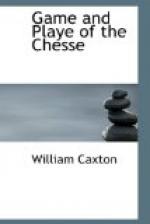thynges as apperteyneth to hym/ And what is a knyght
worth wyth oute hors and armes/ certaynly nothynge
more than on of the peple or lasse pauenture And in
what maner shold the nobles lyue yf no man made cloth
and bought and solde marchandyse/ And what shulde
kynges and quenes and the other lordes doo yf they
had no phisicyens ne cyrurgiens/ than I saye that the
peple ben the glorye of the Crowne And susteyne. the
lyf of the nobles And therfore thou that art a lord
or a noble man or knyght/ despise not the comyn peple
for as moche as they ben sette to fore the in y’e
pleye The seconde cause is why the peple ben sette
to fore the nobles and haue the table wyde to fore
them/ is be cause they begyn the bataylle/ They ought
to take hede and entende to do theyr offices and theyr
craftes/ In suche wyse that they suffre the noble
men to gouerne the cytees and to counceylle and make
ordenances of the peple of the batayll how shold a
labourer a plowman or a craftyman counceylle and make
ordenance of suche thynges as he neuer lerned/ And
wote ne knoweth the mater vpon what thynge the counceylle
ought to be taken/ Certes the comyn peple ought not
to entende to none other thynge but for to do their
seruyse and the office whiche is couenable vnto hem/
And hyt apperteyneth not to hem to be of counceyllys
ne at the aduocacions/ ne to menace ne to threte noman/
for ofte tymes by menaces and by force good counceylle
is distroublid/ And where good counceyll faylleth/
there ofte tymes the cytees ben betrayed and destroyed/
And Plato sayth That the comyn thynges and the cytees
ben blessid whan they ben gouerned by wyse men/ or
whan the gouernours studye in wisedom/ And so hit apperteyneth
to the comyn to lerne to vttre the maters & the maner
of procuracion to fore they be counceyllours/ For
hit happeth oftetymes that he that maketh hym wyser
that he vnderstandeth is made more foole than he is/
And the fourth cause wherfore y’t ther ben in
the tabler as many poynts wyde as ben full. hit is
to wete for that they what euer they be that haue peple
to gouerne/ ought tenforce to haue cytees & caftellis
& possessions for to sette his peple theryn/ And for
to laboure & doo their ocupacion/ For for to haue
the name of a kynge with out royame is a name voyde/
and honour with oute prouffit/ And alle noblesse wyth
oute good maners/ and with out suche thinges as noblesse
may be mayntenyd/ ought better be callid folye than
noblesse. And shamefull pouerte is the more greuous
whan hit cometh by nature of an hyhe and noble burth
or hous. For noman gladly wole repreue a poure
man of the comyn peple/ But euery man hath in despite
a noble man that is poure yf he haue not in hym good
maners and vertuous/ by whiche his pouerte is forgoten/
and truly a royame with oute haboundance of goodes
by whiche hit may be gouerned and prospere/ may better
be callyd a latrocynye or a nest of theeuys than a
royame/ Alas what haboundance was some tymes in the
royames. And what prosite/ In whiche was Iustice/




